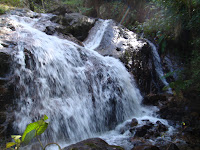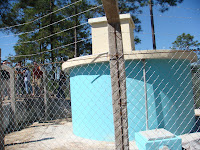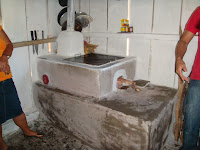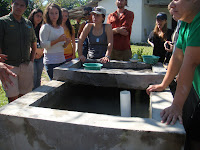But in the end the only steps that matter are the ones you take all by yourself.
-The Weepies
As a foreigner in Honduras, one of the requirements to my stay here is renewing my visa every 90 days. After about three months in the country, a foreigner must leave the CA-4 (which includes Honduras, Guatemala, El Salvador, and Nicaragua- all the countries that touch Honduras) and stay out of these countries for at least 72 hours. This means I just HAVE to leave and explore more of Central America... not a bad deal!
My roommate and I decided to go to Costa Rica where she has a friend whom she met while she studied abroad. So, we had a free place to stay in the mountains- rather volcanoes- of Costa Rica. Yes, Fernando was his name and he lived half way up a volcanic mountain. Sure it sounds dangerous but the last time the volcano erupted it just let out a lot of smoke and the wind was blowing down the other side of the mountain so he wasn't affected... phew!
 |
| Fernando's porch |
Now there are two options to get to Costa Rica- you can either "chicken bus" your way there or take an 18-hour direct bus. We were bringing our laptops to work while we were there so hopping our way on and off chicken buses and dodging bandits and thieves didn't sound like the best idea. So we bought tickets for TransNica and set out at 4am on a Thursday. By about 8am we were already at the Honduras-Nicaragua border. And truthfully, the Central American borders are just as sketchy as they show on TV. You don't feel safe, there is no direction, no order, and you are constantly minding your things because any second they could disappear. You continually have to keep a lookout in every direction and the kids that offer to "help" you with your bags are quick with their hands so it is best to do it yourself.
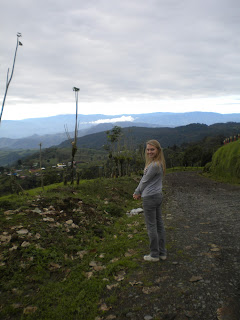 |
| Fernando's street |
|
When we arrived at the border, we all had to get off the bus, pay the entrance fee to the next country, get our passports stamped, and then have our bags checked. This all sounds legit except the fact that this "checking" of the bags consist of a swift slip of the hand in the side of your bag and then you are waved on. On our way back, the police officer took one look at us and didn't even ask to open our bags! It really didn't seem to difficult to be able to conceal something...
While we are through "aduana" (customs) the bus is sprayed down to prevent any kind of bugs, animals, or disease from crossing the border. Everyone shuffles along and we try to make our monetary conversions with the men as discrete as possible. Our Honduran bank cards say they don't work outside of Honduras so we had to make sure we had enough cash for the whole trip... (which turned out to be longer than expected! Good thing I'm a big just-in-case planner!)
 |
| Parul with Susanitas |
|
It took about an hour to get through the border and then we were back on the road, trekking through Nicaragua. Like Honduras, Nicaragua has beautiful landscape and we were surprised to see fields upon fields of massive windmills. Farming and sugar cane fields lined the road. It was a smooth drive until we hit Managua, the capitol of Nicaragua. Here we had to get off again and switch buses and endure the anxiety while we stood, quite waiting, quite vulnerably with our bags at our feet. Another four hours later we reached the Nicaragua-Costa Rica border where we went through customs and baggage check yet again. Then finally at about 10pm that night, we arrived in San Jose, Costa Rica and dear Fernando was there to greet us.
 |
| Fernando's neighborhood |
|
Fernando's house is located off of a steep dirt road with a gorgeous view down the mountain. Colorful hammocks decorate his wide wrap-around porch and his three golden retrievers add to the character of the lofted wooden cottage. His wide open living room, which poured into the kitchen, was so warm and welcoming. We stayed in his loft and were lovingly woken up by the dogs every morning.
 |
| view from his street |
|
One day we decided to take the public bus down to the center of town (Turialba). We weaved through mountains and lush green fields and crossed rivers. Fernando referred to his town as "very rural" but this level of rural was still very far from that of Honduras. Costa Rica is still technically considered a developing country but the houses are significantly more equipped and this country has one of the best health care systems in all of Central America- some say better than the U.S. because the government has universal health care and it has proved to be very successful. Costa Rica also doesn't have a military- another interesting fact!
Just driving through town it is obvious that this country is different from other Central American nations. We felt perfectly safe walking around town at night- we even went out with our cameras! We hardly have any pictures of the streets of Honduras because we don't dare carry our cameras out with us!
So after a few wonderful nights with Fernando-- visiting his favorite local bar, having dinner as one of his neighbor's house, and playing with his cute doggies-- we headed back to San Jose to catch the TransNica bus back to Honduras. BUT.... come to find out, it was sold out! And not only were there no seats for the following day but the next available bus wasn't until Tuesday. We couldn't believe our ears at first- it was Saturday and we weren't going to be able to get back to Tegucigalpa until late Tuesday night- while we both had to get back to work! So we were, essentially, stuck in Costa Rica!
 |
| Volcan Irazú |
|
Now I promise- this truly wasn't as bad as it sounds... who wouldn't want to be stuck in Costa Rica?! We found a hostel and made ourselves comfortable and began to re-plan our next three days. Since we had the time and nothing better to do we decided to go to the top of the tallest volcano in Cost Rica- why not right?! It is called Volcan Irazú and was one of the coolest things I've ever done. Once we were up there, we walked around the crater and could see way down inside of it. At the bottom of the huge opening was this murky, almost fluorescent, neon green water. They say that you can see the steam from the volcano from miles away. While it was pretty chilly and windy way up there, you could lay on the ground and it was hot to the touch! I may have stolen some volcanic sand while I was up there...
 |
| my roommate and me with Fernando |
|
The next couple of days consisted of working on our laptops while basking in the sun at our hostel, touring around downtown and making stops at some local bars to check out the scene. We wandered the railroad tracks at night and went to a delicious tea bar. Though we spent a bit more money than we anticipated, getting stuck in Costa Rica was definitely a cool experience.































